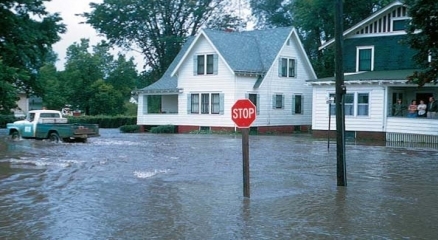Flooding (Environmental & Earth Science)
Contents
Flooding
Flooding
Call 911 if you are in immediate danger and need emergency help. State and local response agencies are the primary responders for people who are concerned about or were affected by flooding. This page lists general information to help people in flooded areas recover and reduce risks caused by a flood. Find your state emergency office or agency from fema.gov.
ALERT: Generator exhaust is toxic. Always put generators outside well away from doors, windows, and vents. Never use a generator inside homes, garages, crawlspaces, sheds, or similar areas. Carbon monoxide (CO) is deadly, can build up quickly, and linger for hours. More information
Never attempt to drive a vehicle through flood water, no matter how shallow it appears and no matter how well you know the road. Attempting to drive through flood water is a leading cause of flood-related injury and death.
Listen to
EPA safety messages about flooding and cleanup precautions
.
Drinking Water and Food
- Boiling water information To kill all major water-borne bacterial pathogens, bring water to a rolling boil for 1 minute. Boil 3 minutes at elevations above 5280 ft (1 mile or 1.6 km).
- What to do about water from household wells after a flood. Use caution restarting drinking water wells. Do not turn on the pump - danger of electric shock. Do not drink or wash with water from the flooded well.
- General info about household wells.
- Keeping food safe during flooding and power outages. Don't test the safety of possibly spoiled food by tasting it! (usda.gov)
Flooding and Mold
- Mold is potential serious problem. Mold cause or aggravate respiratory or other health problems.
- Dry or discard wet items within 24-28 hours to avoid mold.
- Flood cleanup: dealing with mold
- Mold cleanup in schools and commercial buildings. Information for building managers, custodians, or others responsible for maintenance.
- Mold, moisture, and your home
- Reentering a flooded from cdc.gov.
Children, Older Adults
- Protect children after a flood Be sure children are protected from chemicals and organisms. Behavior such as crawling or placing objects in their mouths can increase a child's risk of exposure.
- Make sure older adults have enough water to drink. Dehydration can be life threatening to an older adult. More info...
For Water and Wastewater Facilities
- Pre-hurricane (or flooding) activities - suggest activites to help facilitieis prepare
- Post-hurricane (or flooding) activities - suggest activites to help facilitieis recover
Private Wells and Septic Systems
- Home septic systems Do not use the sewage system until water in the soil absorption field is lower than the water level around the house. If you have a home-based or small business and your septic system has received chemicals, take extra precautions to prevent contact with water or inhaling fumes. Proper clean-up depends on the kinds of chemicals in the wastewater. More information about your septic system.
- Home or pivate drinking water wells Warning - Do not turn on the pump. Do not drink or wash with well water. There is danger of electrical shock and damage to your well or pump if flooded. Water from a private well that has been flooded may be contaminated. More information about inspecting, disinfecting, and testing wells.
